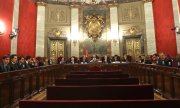Catalan separatists on trial
The trial of twelve Catalan separatists began on Tuesday in Madrid. Spain's public prosecutor wants them to receive sentences of up to 25 years in prison for rebellion, insurgency and misuse of public funds in connection with the 2017 independence referendum. Commentators discuss the role of the judiciary and the media.
Judges deserve benefit of the doubt
It's missing the point to call the proceedings a show trial, Deutschlandfunk believes:
“The otherwise rather critical organisation Freedom House counts Spain among the most democratic countries in the world. Spanish judges have a great deal of independence. That's one of the reasons why members of the royal family and influential politicians are also behind bars there. ... The Spanish judiciary knows that this is a very special trial, one by which the rule of law in the country will be judged. ... The seven judges must now determine whether the accused Catalan separatists acted unlawfully - and if so, to what extent. They must decide whether the prosecution's demands are completely exaggerated, as the separatists as well as others claim. So they must be given the benefit of the doubt.”
Journalists must not be unbiased
The editor-in-chief of La Vanguardia, Màrius Carol, appeals to the journalists attending the trial to take it to heart:
“The trial has aroused great interest, with more than 600 journalists accredited for the proceedings. It is their task to assess the impartiality of the judges, but also the statements of the accused. Always bearing in mind, as Oscar Wilde wrote, that 'It is only about things that do not interest one, that one can give a really unbiased opinion; and this is no doubt the reason why an unbiased opinion is always valueless.'”
London dealt with Scotland more wisely
Former British Prime Minister David Cameron took the wind out of the Scottish independence movement's sails by allowing it to hold a referendum in 2014, The Independent points out:
“He accepted the right of a people to govern themselves, and sought to persuade them in a democratic campaign that they should remain part of the larger union. The idea of making Alex Salmond, first minister of Scotland, a martyr by jailing him was never a remote possibility. If Spain’s prime minister cannot see that what his government is doing in Catalonia is wrong, he should realise that it is counterproductive and risks storing up much greater trouble for the future.”
Rebellion charges are absurd
There is no legal basis for the prosecution's charges, the Neue Zürcher Zeitung criticises:
“The charges of rebellion brought against some of the separatist leaders are politically motivated and aimed at putting them behind bars for as long as possible. But this crime presupposes the use of violence, yet the accused have always spoken out against violent methods. At most, some of the demonstrators were guilty of coercion and failure to obey police orders. And unlike the prosecution, the government's lawyers don't support the rebellion charges. Clearly they're absurd.”
Basic rights being sacrificed
Jordi Cuixart, one of the twelve accused, writes in Le Soir:
“The fight for freedom of expression, the right to self-determination, peaceful assembly and a fair trial, but also the fight against arbitrary detention - in short, the fight for civil and human rights - must be the foundations on which our democratic societies are based. Today in Spain these rights have been sacrificed on the altar of constitutional unity. ... The crisis that is now hitting Spain is both a political and a democratic crisis. The response of the judiciary is only stoking the tensions in our country day after day. The only way out, however, is through dialogue and a political solution.”
Referendum was an attack on the constitution
El Mundo, in contrast, backs the legal proceedings:
“The separatist challenge launched in the autumn of 2017 was the biggest attack on the constitution in four decades. It was not a revolution of smiles, as its authors spuriously claim. Nor was it a democratic process, because there is nothing more anti-democratic than breaking the law. It was an attempt to create a Catalan state in the form of a republic and to undermine national sovereignty. ... This should be borne in mind.”
Young democracy in difficulties
Jyllands-Posten looks at how the Catalonia crisis has changed Spain and what is now at stake:
“In the course of the Catalonia conflict strongly nationalist forceshave gained support in Spain. The Vox Party now has seats in the Andalusian parliament and showed once again on Sunday that it is able to quickly mobilise thousands of protesters together with the conservative PP and Ciudadanos, which favour a tough and unforgiving stance vis-à-vis the separatists. Prime Minister Pedro Sánchez has a fragile mandate. If it comes to new elections what began as an uprising in small and wealthy Catalonia could turn out to have major consequences for Spain's still young democracy.”

